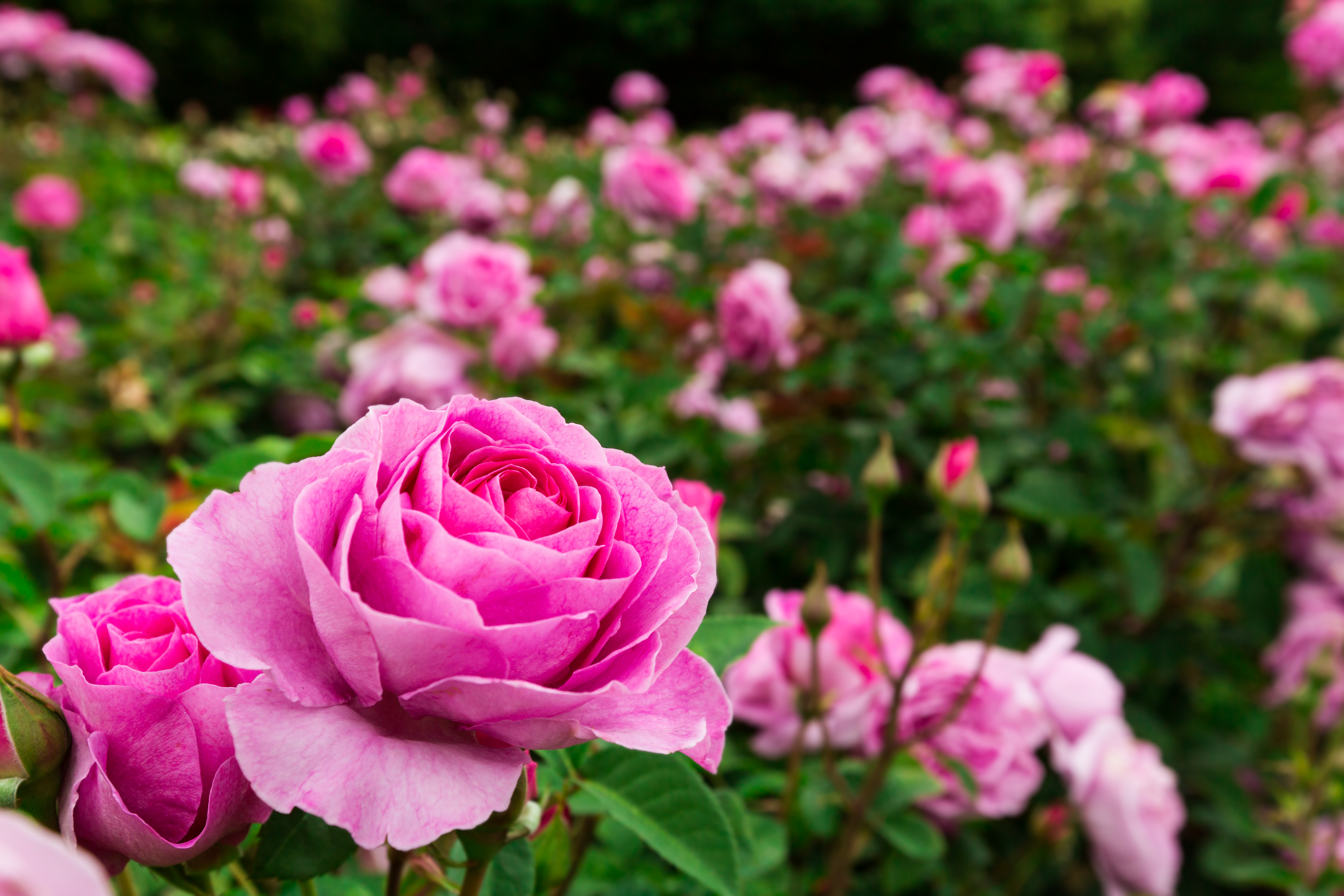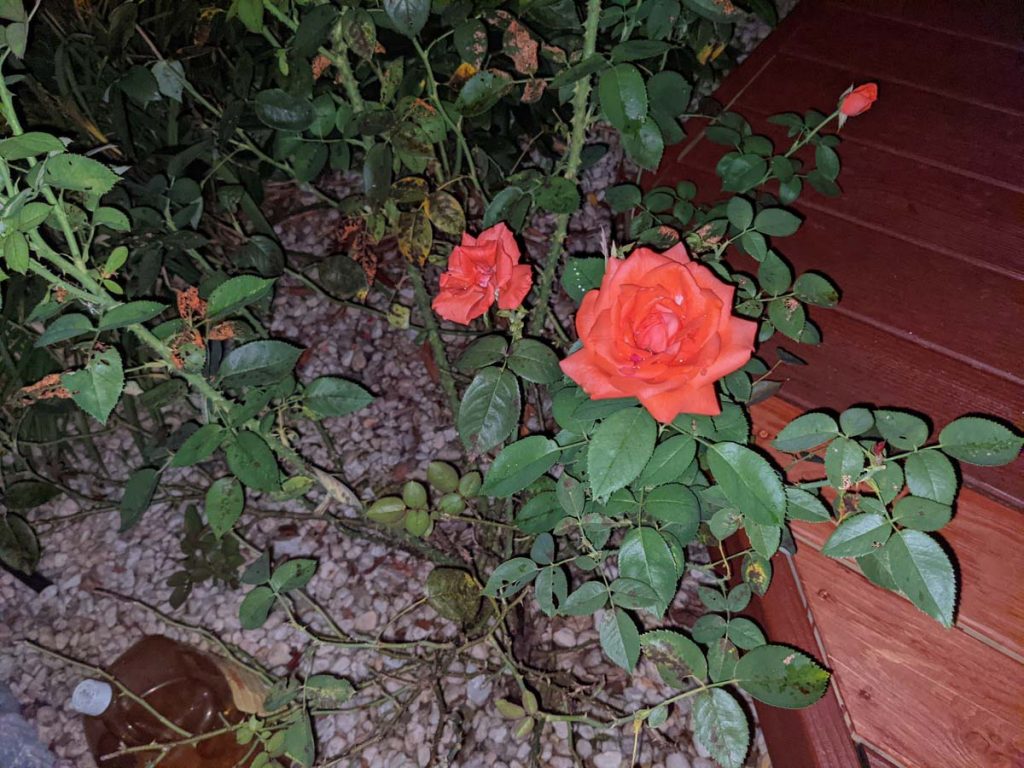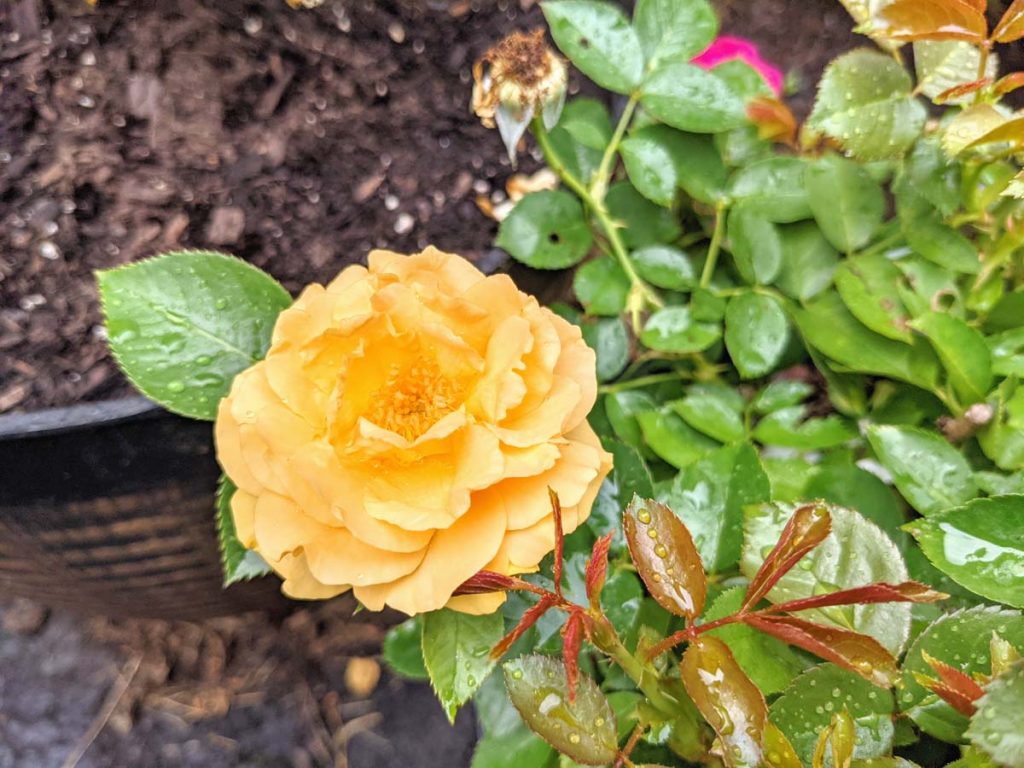The appropriate soil pH for growing roses is somewhat acidic with a pH of 6-7 with a pH of 6.5 considered best. The roots of the rose will have trouble collecting vital nutrients if the soil is too acidic (lower than pH 6) or too alkaline (higher than pH 8) and the rose will probably perish.
Due to the fact that the majority of organic material, when decomposed, is either slightly acidic or pH neutral, which is ideal for roses, garden soil that receives frequent applications of mulch will have an acidity in the range of 6-7.
But for a variety of reasons, particularly acidic or alkaline soil may not be ideal for producing roses.
You should test the pH of the soil before planting roses in a new region of your garden to make sure the circumstances are right.
Continue reading to learn more.
- How to check the pH of soil for rose growing
- How to fix a soil that is very acidic for roses
- How to improve acidic soil for roses.
- How to keep the soil’s pH at the ideal level for growing roses
Table of Contents
How to Test your Soil
pH for Rose Growing
Establishing the pH of your garden soil before planting is a good idea because buying roses can be pricey.
The most effective method is to use a cheap soil test kit from Amazon. The one I’m using here provides correct readings for the soil pH, soil moisture, and daily light input at that specific location in the garden.
All of these elements are crucial for creating strong roses. (Roses require a soil that retains moisture while letting excess water to drain away, as well as at least 6 hours of direct sunlight per day.)
The most trustworthy and affordable method to determine your soil’s pH so that you can confidently plant your roses in the best conditions is to use a soil test kit.
The ideal pH range for planting roses is 6-7, however if you have tested your garden soil and found that it is either too acidic (pH 6 or lower) or too alkaline (pH 7.5 or above), you will need to adjust the soil before planting roses.
How to Amend Alkaline
Soil for Roses
I advise the following to balance excessively alkaline soil (pH greater than 8):
- adding ericaceous compost to your soil.
Garden centers (and Amazon) sell ericaceous compost, which has an acidity of about pH 5 and will assist rebalance the extremely alkaline soils.
While somewhat alkaline soils with a pH of 7.5-8 are more frequent, soils with such high alkalinity are uncommon.
If your soil falls inside this range, the best course of action is:
- To cover your rose with a thick layer of organic stuffbed and dig it into a depth of 15 inches.
The soil can be amended with organic matter byeither manually digging it in or using a tiller, which requires less laborintense.
Garden compost will be pH neutral or slightly acidic once it has gone down completely, which is ideal for roses.
Due to the ecology of the soil, even acidic pine needles (which have a pH of 3-4) will eventually decay to a pH of neutral.
Again you need to take in mind the depth of the rose’s rootsystem, therefore digging in your compost is required.or ericaceous compost to a depth of 15 inches.
Following the application of your soil amendments, you must regularly test the soil to determine whether it is in the right range for growing roses (between pH 6-7).
One month after amending the soil, give it some time to settle and do a soil test. Retest the soil until it regularly falls within the ideal range for growing roses for three months.
Every garden has distinct characteristics, therefore it may take some trial and error to convert an alkaline soil to a slightly acidic soil.
You should eventually end up with balanced soil that is slightly acidic and ideal for producing roses if you continuously test your soil after every amendment and alter your plan.
How to Amend Overly
Acidic Soil for Roses
If the pH of your garden soil has been measured and it isYou must modify the soil if the pH is lower than 6 so that the roots can grow.the roses can effectively absorb the nutrients nitrogen, potash, and phosphates that arenecessary for strong development and a pleasing flower show.
Your soil’s pH can be altered gradually and continuously.that will require repeated testing on occasion.
Effectively raising the pH of soil can be accomplished in two ways.
- If the pH of your soil is below 5, which indicates that it is very acidic, I advise using garden lime to rebalance the acidity.
Garden lime is available from Amazon and all stocked garden centers. Garden lime is best sprayed to the rose planting area in the winter.
Always adhere to the manufacturer’s guidelines because it is simple to overdose and then cause an area’s pH to rise into the alkalinity range (over pH 7).
The recommended course of action if your soil has a pH of 5 is to:
- Add compost and wood ash to the area where you will be planting roses, and till or dig the compost 15 inches deep into the soil.
Wood ash is a fantastic natural treatment for too acidic soils because it is naturally alkaline. Although ash from bonfires and indoor fireplaces is fantastic, BBQ ash should be avoided since it may contain toxins and harm the structure of the soil.
Garden compost will help to reduce the acidity of the soil, provide nutrients, enhance soil structure, and stimulate the soil ecology, all of which will support healthy rose development. Garden compost is also pH neutral (if not slightly acidic).
Dig the mixture 15 inches deep into the soil, combining 2 cups of compost with 2 cups of wood ash.
In order to accommodate the maximum depth of a mature rose’s root system, you must drill the amendments into the soil at this depth.
Before planting your roses, I would advise waiting a month before testing the soil and then repeating the test once every month for three months to make sure the pH readings are consistently in the range of 6-7.
It takes trial and error to correct too acidic soil, thus regular testing over a three-month period and continual mulching are required.
If you are unsure, adding regular garden compost can ensure that your soil’s pH is balanced, whether it is too acidic or alkaline.
Maintaining the Right
Soil pH for Roses
Mulch provides various advantages for rose beds, including enhancing drainage while storing water and cooling the root system during the hottest part of the summer.
But most significantly, well-rotted compost will be slightly acidic or neutral when entirely decomposed and will consequently offer the ideal conditions for roses.
Therefore, you should mulch your rose garden at least twice a year to preserve the ideal soil pH for roses.
A second application of mulch should be made in September to help protect the roots of your rose from the worst of the cold so they can continue to establish over the winter. The first application of mulch should be made at the beginning of spring as this has the added benefit of retaining soil moisture in the upcoming hot summer months.
While keeping the mulch at least 6 inches away from your rose canes, spread a 2-inch layer of mulch around the base of your roses.
Allowing some bare ground between the mulch layer and the rose canes will prevent the above-ground rose wood from becoming rotted if exposed to damp materials for extended periods of time.
There is no need to dig the mulch into the earth as digging could injure the roots of the rose and upset the beneficial soil ecosystem unnecessarily.
Always apply mulch to the soil’s surface and wait for worms and bacteria to organically work the material into the soil.
I advise using a mulch that decomposes quickly, such as garden compost, leaf mold, or horse manure, to keep the pH of the soil where it should be. This will allow the mulch to gradually break down and become a part of the soil throughout the year, preserving the ideal soil conditions.
Pine needles and wood bark are examples of organic material that should not be used since they take a very long time to disintegrate.
These types of mulches have less of an impact on maintaining the ideal soil pH for your roses because they disintegrate considerably more slowly and require years to fully integrate into the soil.
Main Points
- Roses prefer slightly acidic soils because plants can better absorb the nutrients needed to grow and produce a stunning bloom show.
- Compost and wood ash can be added to overly acidic soils as amendments to help reduce the excess acidity.
- The desired more neutral or slightly acidic soil condition will be achieved if the soil is too alkaline by balancing it with ericaceous compost and a lot of organic material.
- – BEST GRANULES: Down to Earth Organic Rose & Flower Fertilizer Mix.The maximum depth of a rose’s root system when it is fully mature will fit within this range, thus you must dig the additives into the soil at this level.
FAQ
Do roses do well in acidic soil?
Since correcting excessively acidic soil is never a precise science and always involves trial and error, it calls for continual mulching and regular testing over a three-month period.
Can I use coffee grounds to fertilize roses?
Adding regular garden compost will balance out your soil’s pH, whether it is too acidic or alkaline, so if in doubt, do it.



